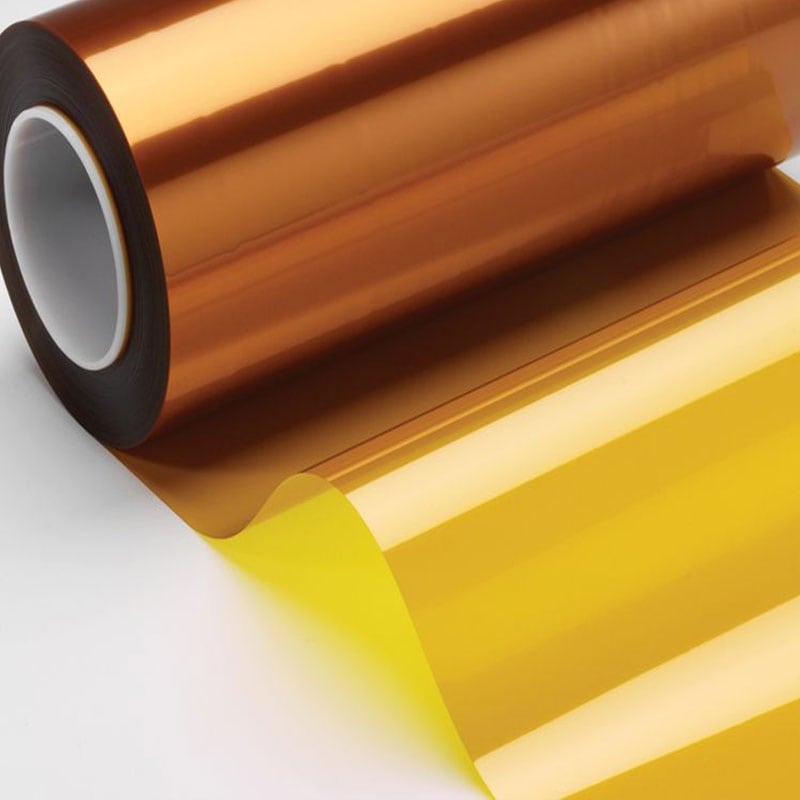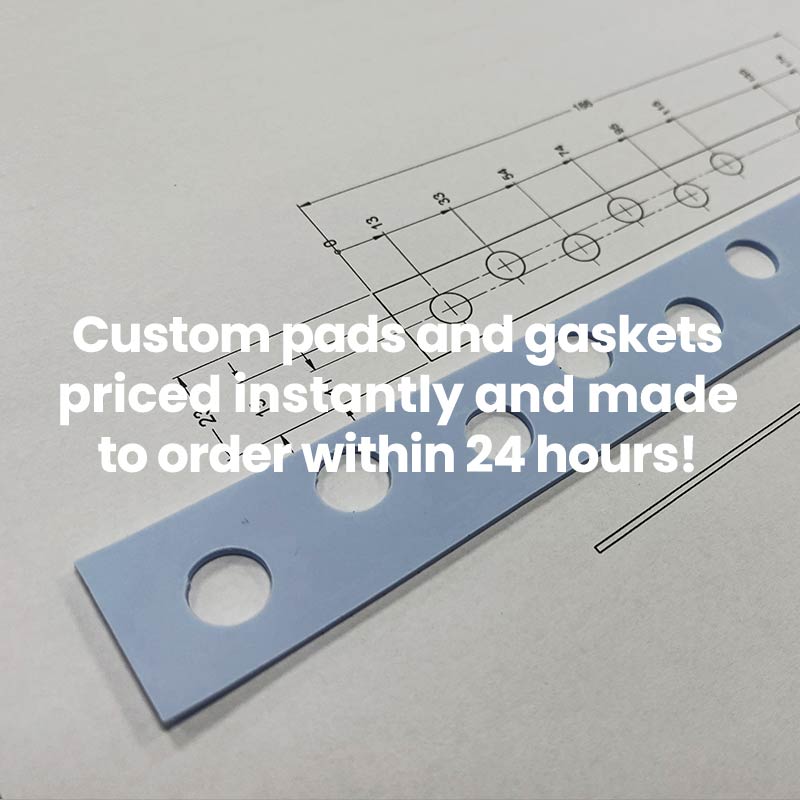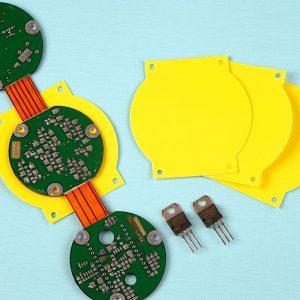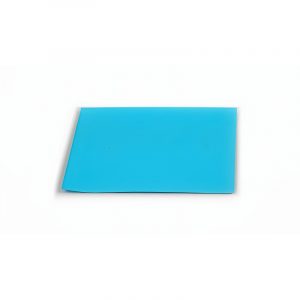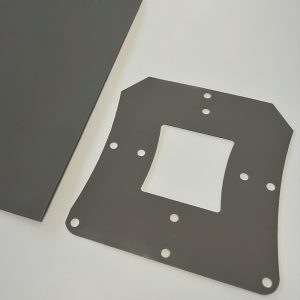
LOADING

Kapton® 100HN – A1 – 0.0504mm | DuPont™
23/08/2023
Kapton® 200HN – A2 – 0.1mm | DuPont™
23/08/2023Kapton® 100HN – A2 – 0.0754mm | DuPont™
Thermally Conductive Subsrate Polyimide Film
£0.00
To get an instant quote for your custom parts, please select your currency and follow steps 1 to 4.
- All purpose – can be laminated, diecut, slit, formed, or adhesive-coated.
- It does not melt. It can be used at both high and low temperature extremes.
- Kapton® polyimide films can be used in a variety of electrical and electronic uses.
5 Sheets In Stock
Description
DuPont™ Kapton® 100HN A2 general-purpose film with adhesive on both sides that has been used successfully in applications at temperatures as low as -269°C (-452°F) and as high as 400°C (752°F). Kapton® 100HN film can be laminated, metallized, punched, formed or adhesive coated. Kapton is the recommended choice for applications that require an all-polyimide film with an excellent balance of properties over a wide range of temperatures.
A2 = Adhesive on both sides
Benefits
- All purpose - can be laminated, diecut, slit, formed, or adhesive-coated.
- It does not melt. It can be used at both high and low temperature extremes.
- Kapton® polyimide films can be used in a variety of electrical and electronic uses.
Features
- Kapton® HN is manufactured, slit and packaged according to the product specifications listed in H-38479, Bulletin GS-96-7.
- Certification - Kapton® HN meets ASTM D-5213 (type 1, item A) requirements
Recommended Uses
- Mechanical parts, Electronic parts, Electrical Insulation, Pressure sensitive tape, Fiber optics cable, Insulation blankets, Insulation tubing, Automotive diaphragms sensors and manifolds, Etching, Shims.
Physical Properties of DuPont™ Kapton® HN at 23°C (73°F)
*Specimen size 25 x 150 mm (1.6 in); jaw separation 100 mm (4 in), jaw speed, 50mm/min (2 in/min). Ultimate refers to the tensile strength and elongation measured at break.
| Property | Unit | 1 mil 25μm | 2 mil 50μm | 3 mil 75μm | 5 mil 125μm | Test Method |
|---|---|---|---|---|---|---|
| Ultimate Tensile Strength at 23°C, (73°F) | psi (MPa) | 33,500 (231) | 33,500 (231) | 33,500 (231) | 33,500 (231) | ASTM D-882-91, Method A* |
| Ultimate Tensile Strength at 200°C (392°F) | psi (MPa) | 20,000 (138) | 20,000 (138) | 20,000 (138) | 20,000 (138) | ASTM D-882-91, Method A* |
| Ultimate Elongation at 23°C, (73°F) | % | 72 | 72 | 78 | 82 | ASTM D-882-91, Method A |
| Ultimate Elongation at 200°C (392°F) | % | 83 | 83 | 83 | 83 | ASTM D-882-91, Method A |
| Tensile Modulus at 23°C, (73°F) | psi (GPa) | 400,000 (2.76) | 400,000 (2.76) | 400,000 (2.76) | 400,000 (2.76) | ASTM D-882-91, Method A |
| Tensile Modulus at 200°C (392°F) | psi (GPa) | 290,000 (2.0) | 290,000 (2.0) | 290,000 (2.0) | 290,000 (2.0) | ASTM D-882-91, Method A |
| Density | g/cc | 1.42 | 1.42 | 1.42 | 1.42 | ASTM D-1505-90 |
| MIT Folding Endurance | cycles | 285,000 | 55,000 | 6,000 | 5,000 | ASTM D-2176-89 |
| Tear Strength-propagating (Elmendorf), N (lbf) | 0.07 (0.02) | 0.21 (0.02) | 0.38 (0.02) | 0.58 (0.02) | ASTM D-1922-89 | |
| Tear Strength, Initial (Graves), N (lbf) | 7.2 (1.6) | 16.3 (1.6) | 26.3 (1.6) | 46.9 (1.6) | ASTM D-1004-90 | |
| Yield Point at 3% at 23°C, (73°F) | MPa (psi) | 69 (10,000) | 69 (10,000) | 69 (10,000) | 69 (10,000) | ASTM D-882-91 |
| Yield Point at 3% at 200°C (392°F) | MPa (psi) | 41 (6,000) | 41 (6,000) | 41 (6,000) | 41 (6,000) | ASTM D-882-91 |
| Stress to produce 5% elong. at 23°C, (73°F) | MPa (psi) | 90 (13,000) | 90 (13,000) | 90 (13,000) | 90 (13,000) | ASTM D-882-92 |
| Stress to produce 5% elong. at 200°C (392°F) | MPa (psi) | 62 (9,000) | 62 (9,000) | 62 (9,000) | 62 (9,000) | ASTM D-882-92 |
| Impact Strength at 23°C, (73°F) | N·cm·(ft lb) | 78 (0.58) | 78 (0.58) | 78 (0.58) | 78 (0.58) | DuPont Pneumatic Impact Test |
| Coefficient of Friction, kinetic (film-to-film) | 0.48 | 0.48 | 0.48 | 0.48 | ASTM D-1894-90 | |
| Coefficient of Friction, static (film-to-film) | 0.63 | 0.63 | 0.63 | 0.63 | ASTM D-1894-90 | |
| Refractive Index (sodium D line) | 1.70 | 1.70 | 1.70 | 1.70 | ASTM D-542-90 | |
| Poisson’s Ratio | 0.34 | 0.34 | 0.34 | 0.34 | Avg. three samples, elongated at 5, 7, 10% | |
| Low temperature flex life | pass | pass | pass | pass | IPC-TM-650, Method 2.6.18 |
Thermal Properties of DuPont™ Kapton® HN Film
| Thermal Property | Typical Value | Test Condition | Test Method |
|---|---|---|---|
| Melting Point | None | None | ASTM E-794-85 (1989) |
| Thermal Coefficient of Linear Expansion | 20 ppm/°C (11 ppm/°F) | -14 to 38°C (7 to 100°F) | ASTM D-696-91 |
| Coefficient of Thermal Conductivity, W/m·K | 0.12 2.87 x 104 | 296K 23°C | ASTM F-433-77 (1987) |
| Specific Heat, J/g•K (cal/g·°C) | 1.09 (0.261) | Differential calorimetry | |
| Heat Sealability | not heat sealable | ||
| Solder Float | pass | IPC-TM-650 Method 2.4.13A | |
| Smoke Generation | Dm=<1 | NBS smoke chamber | NFPA-258 |
| Shrinkage, % 30 min at 150°C | 0.17 | PC-TM-650 Method 2.2.4A; | |
| Shrinkage, % 120 min at 400°C | 1.25 | ASTM D-5214-91 | |
| Limiting Oxygen Index, % | 37–45 | ASTM D-2863-87 |
| Glass Transition Temperature (Tg ) | A second order transition occurs in Kapton® between 360°C (680°F) and 410°C (770°F) and is assumed to be the glass transition temperature. Different measurement techniques produce different results within the above temperature range |
Typical Electrical Properties of DuPont™ Kapton® HN Film at 23°C (73°F), 50% RH
| Property Film Gage | Property Film Gage | Test Condition | Test Method |
|---|---|---|---|
| Dielectric Strength 25 μm (1 mil) | 303 V/m kV/mm, (7700) (V/mil) | 60 Hz 1/4 in electrodes 500 V/sec rise | ASTM D-149-91 |
| Dielectric Strength 50 μm (2 mil) | 240 V/m kV/mm, (6100) (V/mil) | Test Method | Test Method |
| Dielectric Strength 75 μm (3 mil) | 201 V/m kV/mm, (5100) (V/mil) | Test Method | Test Method |
| Dielectric Strength 125 μm (5 mil) | 154 V/m kV/mm, (3900) (V/mil) | Test Method | Test Method |
| Dielectric Constant 25 μm (1 mil) | 3.4 | 1 kHz | ASTM D-150-92 |
| Dielectric Constant 50 μm (2 mil) | 3.4 | 1 kHz | ASTM D-150-92 |
| Dielectric Constant 75 μm (3 mil) | 3.5 | 1 kHz | ASTM D-150-92 |
| Dielectric Constant 125 μm (5 mil) | 3.5 | 1 kHz | ASTM D-150-92 |
| Dissipation Factor 25 μm (1 mil) | 0.0018 | 1 kHz | ASTM D-150-92 |
| Dissipation Factor 50 μm (2 mil) | 0.0020 | 1 kHz | ASTM D-150-92 |
| Dissipation Factor 75 μm (3 mil) | 0.0020 | 1 kHz | ASTM D-150-92 |
| Dissipation Factor 125 μm (5 mil) | 0.0026 | 1 kHz | ASTM D-150-92 |
| Volume Resistivity 25 μm (1 mil) | 1.5 x 1017 | ASTM D-257-91 | |
| Volume Resistivity 50 μm (2 mil) | 1.5 x 1017 | ASTM D-257-91 | |
| Volume Resistivity 75 μm (3 mil) | 1.4 x 1017 | ASTM D-257-91 | |
| Volume Resistivity 125 μm (5 mil) | 1.0 x 1017 | ASTM D-257-91 |
Thermal Coefficient of Expansion, DuPont™ Kapton® HN Film, 25 µm (1 mil), Thermally Exposed
| Temperature Range, °C, (°F) | ppm/°C |
|---|---|
| 30–100 (86–212) | 17 |
| 100–200 (212–392) | 32 |
| 200–300 (392–572) | 40 |
| 300–400 (572–752) | 44 |
| 30–400 (86–752) | 34 |
Materials Direct
Precision cut technical materials fast
We’re available to assist you for your next project
A division of Universal Science UK
www.universal-science.com
Related products
-
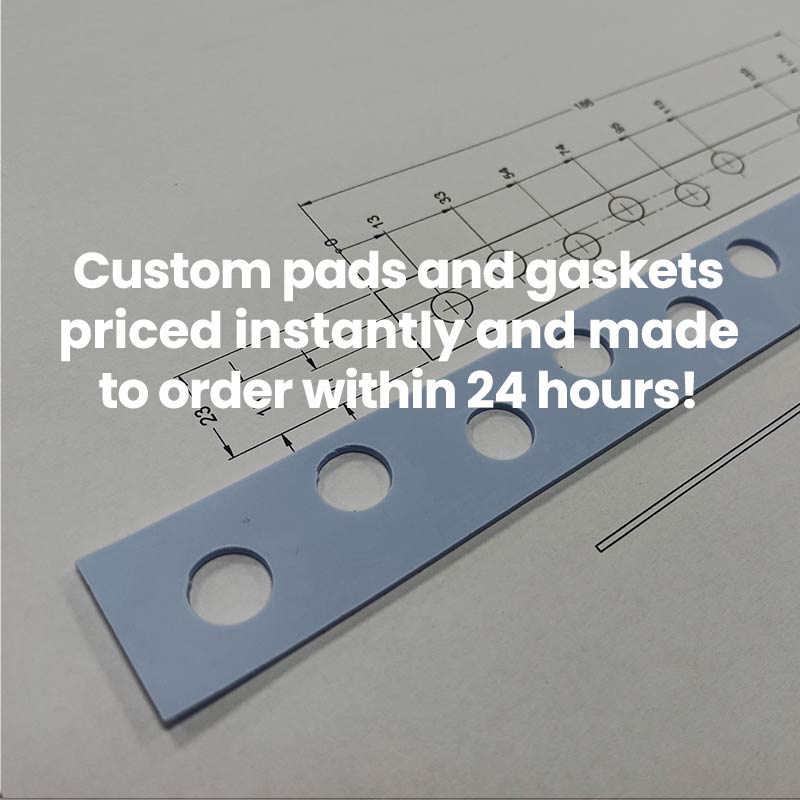 Select options
Select optionsT-Pad 1500™ – A1 – 0.23mm | Universal Science™
£0.00 SKU: 93450- Electrically insulating and moderate thermal performance properties
- Thermal conductivity = 1.5 W/mK
- Requires mounting pressure via spring, metal clip or clamp
- A1 – Adhesive layer on one side
-
 Select options
Select optionsKeratherm U85 A0 – 0.2mm | Kerafol™
£0.00 SKU: 93053- High dielectric strength and thermal performance
- Thermal conductivity of 3W/mK
- Non sticky, available with adhesive coating
-
 Select options
Select optionsT-Pad 3000™ – A1 – 0.5mm | Universal Science™
£0.00 SKU: 94353- Electrically insulating and moderate thermal performance properties
- Thermal conductivity = 3.0 W/mK
- Requires mounting pressure via spring, metal clip or clamp
- Adhesive on One Side
